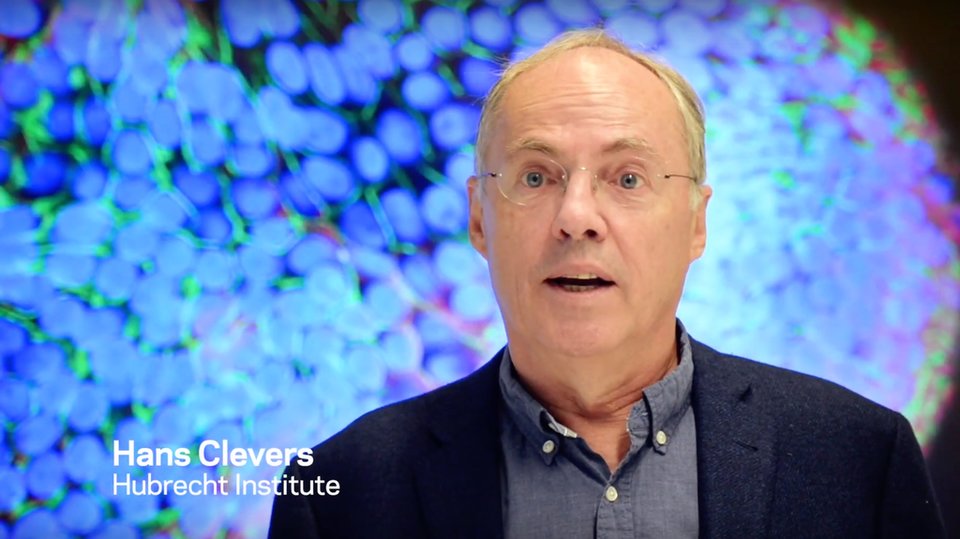#Eureka
What kept us busy these past months? Below you will read more about the scientific progress we made on our way to outsmarting cancer and impacting lives. Read about our cutting-edge research, some examples of collaborations and meet our new team members.
Events: social interaction through science
Collaboration instead of competition, that’s what Oncode is all about. To facilitate knowledge sharing and collaboration we organize various workshops, masterclasses and other events throughout the year. Based on science we stimulate social interaction in for example a 2-day event on Tumour Heterogeneity, a masterclass day and a clinical workshop focused on colorectal cancer.
Read more...
Publication highlights
Excellent science is what makes our hearts beat faster. Over the past few months our Oncode Researchers have published numerous articles in peer-reviewed journals, we would like to highlight a few of their accomplishments.
Read more...
Organoids
in cancer research- how does it work?
Organoids. It has to be one of the most used buzzwords in molecular research over the last few years. These miniature versions of an organ are grown in the lab out of small tissue samples of individual patients. The potential of this technology is quite far reaching.
Read more...
Maarten van
der Weijden’s extraordinary achievement for cancer research
Maarten van der Weijden dominated the Dutch news for days when he swam the Elfstedentocht in June this year. In 75 hours, he covered an impressive 196 km! Maarten is an ex-cancer patient and with this exceptional achievement he raised over 6,1 million euros for cancer research.
Read more...
And the Oscar goes to…
We are very proud that many excellent scientists are part of Oncode Institute and we are pleased to share exciting news about prestigious awards they win, grants they have obtained, or other forms of recognition. Recently, Oncode Investigators Hugo Snippert (UMC Utrecht), Monique den Boer (Princess Máxima Center), Leila Akkari (NKI), Sylvie Noordermeer (LUMC) and Jarno Drost (Princess Máxima Center) were in the spotlight.
Read more...
New faces in our valorization team
Oncode Institute wants to impact the lives of people dealing with cancer. We believe a key element in doing so is bringing the knowledge, insights and inventions of our academic researchers to the clinic. The valorization team was set up in 2018 to support researchers. This year, four valorization experts have joined the team.
Read more...

#Eureka
Events: social interaction through science
Collaboration instead of competition, that’s what Oncode is all about. To facilitate knowledge sharing and collaboration weorganize various workshops, masterclasses and other events throughout the year. Based on science we stimulate social interaction in for example a 2-day event on Tumour Heterogeneity, a masterclass day and a clinical workshop focused on colorectal cancer.
The Tumour Heterogeneity event brought together researchers from different disciplines and gave them the opportunity to exchange latest insights, approaches and model systems to understand the origins of tumour heterogeneity. A subject with great potential impact for patients since its implications for tumour evolution and therapy resistance.
Our first Oncode Masterclass day was all about sharing insights in science and connecting our diverse research community. The day was filled with sessions about the Oncode Compound Library, our approach to Open science and potential applications of organoid technology.
To enhance the link between fundamental research and unmet needs in the clinic, we kicked off a series of clinical workshops. This first one was focused on colorectal cancer. Both clinicians and fundamental researchers discussed the current clinical practice, unmet medical needs and ongoing research with a varied audience.
#Eureka
Publication highlights
Excellent science is what makes our hearts beat faster. Over the past few months our Oncode Researchers have published numerous articles in peer-reviewed journals, we would like to highlight a few of their accomplishments.
In collaboration with the labs of Ton Schumacher, Lodewyk Wessels and Wilbert Zwart, the groups of Jos Jonkers and Karin de Visser published their research into the role of p53 in systemic imflammation in breast cancer patients. Systemic inflammation is associated with poor overall survival in different cancers. The current work shows that loss of p53 leads to increased secretion of signalling molecules from tumour cells. This induces systemic inflammation which leads to higher rates of metastasis and further paves the way for personalized approaches in treating breast cancer. Read more in Nature.
The power of organoid technology as a platform to study mechanisms behind tumour formation were shown again by the group of Hans Clevers in collaboration with the groups of Ruben van Boxtel, Jacco van Rheenen and Michiel Vermeulen. Using CRISPR/Cas9 they made BAP1 deficient bile duct organoids. BAP1 is a tumour suppressor in bile duct cancer. The current work shows that this suppressor function is mediated through its activity as a chromatin regulator. You can read more in Cell Stem Cell.
In the July edition of Cell the group of Daniel Peeper, in collaboration with the group of Ton Schumacher, publishes their work about augmenting the impact of immunotherapy. To do so, they conducted a genome wide CRISPR/Cas9 screen which revealed that loss of the TRAF2 gene can enhance the therapeutic effect of immunotherapy on tumours.
#Eureka
Organoids in cancer research – how does it work?
Organoids. It has to be one of the most used buzzwords in molecular research over the last few years. These miniature versions of an organ are grown in the lab out of small tissue samples of individual patients. The potential of this technology is quite far reaching.
Did you know it helps to reduce the number of laboratory animals needed for biomedical research? To highlight the doors that organoids have opened, the Hubrecht Institute, one of our partner institutes, produced a video in which Oncode Investigator Hans Clevers explains the basics of the use and added value of human organoids in cancer research.
#Eureka
Maarten van der Weijden’s extraordinary achievement for cancer research
Maarten van der Weijden dominated the Dutch news for days when he swam the Elfstedentocht in June this year. In 75 hours, he covered an impressive 196 km! Maarten is an ex-cancer patient and with this exceptional achievement he raised over 6,1 million euros for cancer research.
We are very proud that one of the selected projects which will receive funding is the research of Oncode Investigator Jarno Drost and his colleague Eelco Hoving of the Princess Máxima Center. Jarno and Eelco are working on better understanding the biology behind rhabdoid tumours. These are rare but very aggressive kinds of tumours that occur primarily in the brain and kidneys of children. The prognosis is usually bad and the need for new treatment options is high.
Jarno and Eelco have set up technology in their labs to grow patient derived tumours in a petri dish. In this way they create mini-rhabdoid tumours allowing them to study the molecular and cellular properties of the tumour in detail and test different drug candidates to find better treatment methods. All what´s left to say is big thank you to the swimming hero who helps to make this all possible.
#Eureka
And the Oscar goes to…
We are very proud about the fact that many excellent scientists are part of Oncode Institute and we are always pleased to share exciting news about prestigious awards the win, grants they have obtained, or other forms of recognizing their excellence. Recently, Oncode Investigators Hugo Snippert (UMC Utrecht), Monique den Boer (Princess Máxima Center), Leila Akkari (NKI), Sylvie Noordermeer (LUMC) and Jarno Drost (Princess Máxima Center) were in the spotlight.
Monique den Boer received a surprise visit from ZonMw and was awarded with the Open Science Impuls award. She has brought a major contribution to the goals of Open Science: responsive, transparent and responsible science. The final report of her Vici project "Challenging old dogmas: improved diagnostics and tailored therapy by unraveling biology or acute leukemia in children" showed that her research group makes Open Science possible. During her project, she published 33 open access articles, by which the knowledge obtained is accessible for everyone. She was also able to publish negative results of her studies, which is not so common in our scientific field.
Another Oncode Investigator in the spotlight was Hugo Snippert of the UMC Utrecht. Together with industry partner VyCAP, he received one of the Health~Holland Organ-on-chip awards for their project ‘Capture tumour evolution on chip’. To improve the understanding of tumour evolution, a new microfluidic platform will be developed and tested. The goal is to combine live-cell imaging of growing tumour organoids with single-cell genomic analysis of all the individual cells that originate from the imaged tumour.
Leila Akkari (NKI) and Sylvie Noordermeer (LUMC), both Oncode Investigators, received the Vidi grant for their research. Sylvie uses her grant for research into the BRCA1 protein. Errors in this protein cause all kinds of cancers. Leila will use her grant to further research the use of immune cells for the treatment of glioblastoma.
Finally, Oncode Investigator Jarno Drost (Princess Máxima Center) was awarded with the ERC grant of €1.5 million euros. He received this prestigious grant to unravel the aggressive nature of rhabdoid tumors.
#Eureka
New faces in our valorization team
Oncode Institute wants to impact the lives of people dealing with cancer. We believe a key element in doing so is bringing the knowledge, insights and inventions of our academic researchers to the clinic. The valorization team of Oncode was set up in 2018 to support researchers achieve exactly this. We are very proud that this year, four more valorization experts have joined the team. We’ve asked them to introduce themselves by sharing their added value to the Oncode community.

Shobhit Dhawan, Fund Manager at Oncode bridge fund
“Prior to joining the Oncode Bridge Fund, I was an early stage investor at UvA Ventures for 4 years, where I made investments in tech and life science spin offs in the Amsterdam region. In the coming years, I’ll be investing in groundbreaking science spun out of Oncode Institute, with an ultimate goal of bringing benefit to cancer patients’ lives. Our patient-centric and science-first investment thesis is in particular designed to advance innovations which are years from clinical approval.”

Yuva Oz, Business Developer at Oncode
“I love bringing people together, especially with diverse backgrounds. Having a deep scientific training and my PhD work at Hubrecht Institute further developed through my experience at industry driven oncology clinical trials. Working both in operations as well as business development allowed me to see both sides of the equation. This was also the driver of my passion for joining Oncode: better drugs, faster by creating an efficient collaborative environment. Besides my role of working with Oncode Investigators to translate their findings to the clinic, I focus on our industry engagement program. Bringing scientists, clinicians and industry together in a dynamic and open ecosystem has the potential to unveil the most revolutionary ideas to surface and develop solutions that we can take to market quickly and effectively. I strongly believe that instead of working in the small islands of research, we can jointly solve problems we might not individually solve or recognize. That is what our valorization team thrives for.”

Alexander Turkin, Business Developer at Oncode
“I obtained a BSc degree in physics and a MSc degree in nanoscience. Growing fascination for biology and medicine led me to pursue a PhD in biophysics at the University of Groningen. Subsequently, I decided to continue my journey in the Life Sciences branch as a Business Consultant. In this role I was helping both academic and industrial parties to obtain funding, establish partnerships, build consortia, do market research and develop commercialisation plans. At Oncode, I intend to leverage this expertise to support both scientists and spin-offs with acquiring funding and establishing collaborations. Furthermore, I set out to help Oncode Investigators with translational aspects of their research, ultimately creating impact for patients. Fundamental research is captivating and, importantly, it begets many applications. Together, hand in hand, we can maximise impact on society and improve people’s lives. Let’s do this!”

Amber Liu, Business Developer at Oncode
“Helping people most in need is my raison d'être – and I believe the potential impact in translating research discoveries to the clinic faster, is tremendous. I gravitate naturally towards pressing healthcare challenges and this has led me from an undergrad in life sciences to clinical pharmacy studies at the University of Toronto. After which, my desire to engage in impactful work led me to various roles where I’ve had the opportunity to work with academic and industry stakeholders across the EU. These projects centred mainly on catalyzing life science innovations development through collaborative partnerships, strategic funding, and exploring commercial opportunities have primed me for Oncode’s valorisation team. Coming to Oncode, I look forward to supporting novel inventions towards the clinic via effective stakeholder collaborations, inspiring opportunities for co-creation and accelerated knowledge transfer. In particular, my work will aim to increase valorisation output via accelerated knowledge transfer. Ultimately, with the prospect of cutting-edge research and inventive breakthroughs for oncology looming, I am eager to explore how we can improve the lives of the patients we serve, together.”

